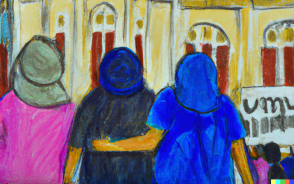[ad_1]
Within the aftermath of revolutionary youth-led protests in 2020–21, Thailand is now ruled by an elected administration led by Paetongtarn Shinawatra‘s coalition authorities. This peculiar coalition contains royalist, military-linked, and clientelistic events, all below the management of the Pheu Thai Occasion (PTP), a centrist and personalistic occasion with pro-reform democratic components. Because the Might 2023 basic elections, youth-led road protests have vanished, and Thailand seems to have entered a interval of hybrid regime after a decade of authoritarian rule.
Regardless of appearances of larger stability, Thailand’s social motion sector and occasion system stay below delicate but intense repression by institution forces. These forces understand consultant politics—whether or not expressed via road protests or inside political establishments—as a systemic menace to their longevity and survival, and have manipulated consultant techniques in varied methods. Professional-reform and democratic events, together with the incumbent Pheu Thai and significantly the anti-establishment Folks’s Occasion (PP)—the third incarnation of the Future Ahead Occasion (FFP) and Transfer Ahead Occasion (MFP) after they had been banned—face threats of dissolution and selective politician bans by the Constitutional Court docket. In the meantime, many youth motion leaders have been charged below draconian legal guidelines, significantly the lèse-majesté regulation, going through long-term imprisonment, compelled to halt their actions, and lots of have gone into exile.
This text provides a contemporary perspective on the challenges that Thailand faces in reaching a democratic breakthrough by foregrounding the position that state-led repression has performed in limiting the organisational energy and social bases of democratic actions and events. By correctly apprehending this actuality, I argue, we’re higher positioned to grasp what actions, events, and their supporters—inside or outdoors Thailand—ought to prioritise amidst ongoing repression.
Sturdy spirit, weak physique
Traditionally, Thailand has been locked in a continuing battle between reformist or revolutionary political events and social actions on one facet, and the hegemonic institution—significantly the monarchy and the navy—on the opposite. Because the 1932 revolution, royalist forces, skeptical of Siam’s readiness for consultant democracy and perceiving threats to royal authority, have taken measures to suppress democratic associations. A 1933 royal decree dissolved each the Folks’s Occasion Affiliation and the Nationalist Occasion Affiliation, and amended legal guidelines to ban any social and political group deemed a menace to nationwide safety.
The motion eradicated the nascent roots of democratic associational life within the aftermath of the 1932 revolution, instituting a no-party system that continued till 1946. Acts of autocratic repression grew to become routine, with institution elites repeatedly stifling the event of actions and events. Below Sarit Thanarat’s royalist regime (1958–1963), all civic area for consultant organisations, together with events and actions, was eradicated. Sarit wielded Article 17 of the 1959 Interim Structure, which granted the prime minister unchecked authority to “difficulty any order or carry out any act in any way”.
State and royalist repression have for many years therefore accomplished a lot to form the infrastructural improvement of actions and events, leading to weak social bases and organisational constructions that persist till today. Whereas all events had been affected, pro-democracy events had been hit particularly laborious. Following the October 1976 bloodbath, when progressive actions had been annihilated and left-wing events dissolved, Thailand’s events grew to become largely clientelistic. They discovered little motive to spend money on deep societal roots or partnerships with weakened social actions, which confronted extreme state repression and cooptation. Royalist regimes suppressed contentious social actions—particularly labour, peasant, and pupil actions—whereas co-opting state-based civil society organisations (e.g., rural improvement, financial, social and cultural rights, and different grassroots organisations) into the state equipment, sustaining vertical relationships moderately than real autonomy.
Motion organisations specializing in democratisation or civil and political rights have hardly ever had entry to state funding—which frequently imposes restrictions moderately than offering help—and should depend on exterior funders and philanthropy, which generally prohibits partisan actions or constructing relationships with events. This association makes them accountable to funders moderately than native constituents, additional hindering their skill to construct robust organisational bases.
The follow of banning counter-establishment events outright has intensified for the reason that coup of 2006, when institution forces perceived vital threats from the success of Thaksin Shinawatra’s Thai Rak Thai (TRT)—the primary Thai occasion to serve a full time period with out interruption and a well-liked majority authorities—to their established order. They used “impartial establishments” established below the 1997 Structure, together with the Constitutional Court docket and different monitoring our bodies, to orchestrate the banning of well-liked events and politicians. Since then, the occasion has been banned twice by the Constitutional Court docket (making Pheu Thai its third incarnation), and 4 of its prime ministers have been dismissed, together with Prime Minister Paetongtarn’s predecessor Srettha Thavisin. Regardless of its post-2023 coalition with conservatives, the occasion nonetheless continues to face threats of dissolution from the Constitutional Court docket and pro-establishment mobilisation from former anti-Thaksin Yellow Shirt leaders.
State repression has considerably deinstitutionalised the Pheu Thai’s organisational and community constructions since then. TRT profoundly modified Thailand’s financial and political panorama, lifting tens of millions from absolute poverty and embedding a mass democratic political tradition that fostered political rights consciousness, resulting in the rise of the Pink Shirt motion and its pro-democracy identification. Nonetheless, the occasion management from the TRT period (2001–2006) had been banned or compelled to flee throughout a decade of junta rule, leading to a closely diminished occasion capability—significantly in coverage innovation.
A decade of authoritarian rule below the junta that seized energy in 2014 weakened PTP voters’ partisanship (i.e. their enduring attachment to or identification with a political occasion), as proven within the 2023 elections, when the occasion misplaced its main place for the primary time. The occasion’s legacy of uplifting tens of millions has light over time. Its ideological and constituency bases—as soon as embodied within the Pink Shirt motion—even have diminished because of the absence of continuous occasion organising on the bottom throughout the junta interval, resulting in weakened social ties amongst grassroots networks. Importantly, its mid-level mobilisational infrastructure—a community of rural canvassers who linked occasion organisations with rural bases, communicated and interpreted programmatic positions on the village degree, and organised native voters and their households—was largely repressed throughout the decade of junta rule. Pheu Thai’s rural infrastructure has not recovered, because the occasion has not prioritised rebuilding it.
In the meantime, the Folks’s Occasion (PP), a successor of the banned Transfer Ahead and Future Ahead, faces related however much more intense repression. Its former chief, Pita Limjaroenrat, has been banned from politics for 10 years, and the occasion dangers dropping extra of its 44 leaders in ongoing Constitutional Court docket circumstances associated to their marketing campaign for the repeal of the lèse-majesté regulation. Occasion management has been in disarray and can’t domesticate new leaders rapidly sufficient to switch those that had been or shall be banned.
Every occasion ban forces the organisation to spend numerous time managing administrative transitions to new entities, and occasion networks on the bottom are required to halt operations or dissolve throughout these limbo durations. Its organisational and community construction has change into extra deinstitutionalised and shriveled over time as a result of repression. Consequently, PP has been much less capable of set up a mass-based occasion because it envisioned and tends to be trapped below the iron regulation of oligarchy: as my interviews with civil society figures and occasion staff have advised, decision-making more and more rests with occasion elites and political stars moderately than its social motion bases and grassroots memberships.
Banning events not solely diminishes the long-term capability of the Pheu Thai and Folks’s Occasion and limits their energy bases—constructed on established relationships with constituents requiring sustained organizing efforts—but additionally destabilises the occasion system as an entire. When events understand that they could possibly be banned or deinstitutionalised, they restrict their grassroots growth and make investments much less in constructing branches and organisational constructions. As an alternative, politicians deal with free community constructing—often clientelistic—to stay agile and adaptable to exterior threats, enabling fast transitions to new entities when banned. This example most clearly impacts Pheu Thai, which initially emerged by forming a grand coalition of provincial dynastic households and their events, incorporating over 100 MPs from these events and inheriting their clientelistic networks.
It’s also necessary to recognise the repressive, divide-and-rule context of the post-2023 elections. The Transfer Ahead Occasion, which received essentially the most seats, couldn’t type a authorities pact with the runner-up, Pheu Thai, as a result of obstruction by the junta-appointed Senate, resulting in political gridlock. It is a basic prisoner’s dilemma: each events couldn’t type a authorities pact, confronted defection from their associate, and thus misplaced their likelihood to type a post-authoritarian transition authorities—the optimum end result. Confronted with such a political disaster and institution strain —or arguably, a cope with the institution—Pheu Thai pragmatically fashioned an uncommon alliance with its historic junta rivals, sending robust indicators to its partisan voters that its pro-reform, pro-democratic traditions had been largely deserted.
In response to Noam Lupu’s concept of occasion breakdown—which in my view might effectively apply to Pheu Thai—the occasion faces a excessive likelihood of collapsing in future elections. First, the occasion’s model as pro-poor, pro-democracy, and pro-reform has been diluted. When Pheu Thai, beforehand positioned as a pro-democracy drive alongside Transfer Ahead throughout the junta interval, fashioned a authorities with royalist and junta events after the Might 2023 elections, massive segments of pro-democracy and partisan voters indifferent from the occasion. They grew to become much less capable of differentiate Pheu Thai from different clientelistic, royalist, and junta alliance events, signaling that it had change into extra compromised or aligned with the institution and against deep financial and political reforms.
Second, as a coalition with weak capability to manage its companions and stop fragmentation, the Pheu Thai-led authorities appears not solely much less capable of ship pro-democracy, anti-junta, and deeply reform insurance policies as promised throughout its election campaigns but additionally seems to carry out poorly economically amid international instability and Thailand’s power points stemming from long-term political turmoil. Thus, Pheu Thai struggles to attain consensus amongst voters on valence points like financial prosperity or anti-corruption. Its longtime voters are unsure concerning the occasion’s new positions and will shift their help to different events within the subsequent election. These situations—the place the Pheu Thai’s model is diluted, long-term voter partisanship erodes, and the federal government performs poorly—set the stage for voters to defect en masse, doubtlessly resulting in occasion breakdown.

Sretta Thavisin, Thaksin Shinawatra and Paetongtarn Shinawatra pictured collectively on 13 December 2024 (Picture: Pheu Thai on Fb)
Alternatives amid repression
Amidst ongoing repression, there isn’t a shortcut to an answer. Actions and events should prioritise constructing robust organisational and community infrastructures, cultivating high quality management, and organising robust relationships with their constituencies.
For progressive, movement-based events—significantly the Folks’s Occasion, which emerged from and recruited closely throughout the social motion sector—it’s essential to deal with constructing a mobilisational infrastructure. This contains creating organisations, networks, and management to maintain the social motion sector and its overlapping occasion community, thereby sustaining or increasing their capability and making certain long-term survival. Students have warned that when events recruit extensively from the motion sector with out organising new management and contributing again to the actions, each entities threat changing into weak and going through deinstitutionalisation over time.
Nonetheless, within the extended repressive atmosphere, the deal with organisational and infrastructural constructing appears secondary to different quick duties. After the earlier ban, Transfer Ahead devoted its restricted assets to parliamentary work moderately than constructing grassroots networks, increasing constituencies, and cultivating younger management—which had been as soon as a precedence for Future Ahead. Social actions additionally allotted their restricted assets to pressing campaigns, resembling releasing activists from jail, campaigning for amnesty legal guidelines, constitutional amendments, and different rights-based agendas.
Amid repression, funding shortage, and the retreat of funders from Thailand and Southeast Asia to different areas or their dwelling nations—as is anticipated below the second Trump administration within the US—motion organisations usually prioritise frontline marketing campaign work over long-term targets like management improvement or infrastructure constructing.With out entry to state assets, it’s troublesome for social actions and the Folks’s Occasion to deal with constructing mobilisational infrastructures. Consequently, as a result of state repression, each Folks’s Occasion activists and social motion activists are inclined to develop tunnel imaginative and prescient, failing to recognise how their infrastructures are intertwined and mutually dependent. As an alternative, they function as if in separate spheres, which undermines their targets of rights-based reforms, democratisation, and long-term survival.
Amid ongoing and worsening model dilution, Pheu Thai requires a complete reinvention to outlive potential breakdown. The occasion could anticipate this; it has established a brand new activity drive of younger professionals, the Pheu Thai Academy, to steer institutionalisation efforts, strengthen programmatic positions, construct future leaders, improve parliamentary work, and innovate new insurance policies.
Associated

20 years after Tak Bai, impunity trumps justice
Authorities proceed to slow-pedal judicial processes within the face of group calls for for accountability
That is nonetheless a formidable activity as a result of Pheu Thai has lengthy since change into a personalistic and clientelistic occasion, making inside reform difficult within the quick time period. These younger reformers usually face resistance from older oligarchs and native bosses throughout the occasion. Furthermore, Pheu Thai has lengthy been a primary goal of multinational efforts to undermine it. Its present minority place in parliament, together with a weak coalition fraught with fragmentation and contestation from different junta and clientelistic events, implies that its pro-reform, pro-democratic insurance policies—resembling constitutional amendments—are laborious to move in each the decrease home and the establishment-controlled higher chamber. Implementing reforms can also be troublesome as a result of weak occasion capability. With a diluted model, occasion leaders could battle to recruit new, proficient people. Management is mired in short-term, day-to-day survival moderately than long-term organisational constructing. Whereas Pheu Thai appears partially heading in the right direction, its overwhelmed management could also be unable to take a position sufficiently in occasion organisation and networks. Occasion breakdown thus looms.
Furthermore, occasion elites of each Pheu Thai and the Folks’s Occasion—significantly older politicians nearing the top of their careers, those that will quickly be banned, and political stars—are inclined to deal with short-term, electoral good points and interesting to median voters, moderately than on long-term capability constructing and constituency pursuits that hyperlink the occasion to its social base. In distinction, grassroots occasion activists and youthful leaders, particularly these accountable to particular constituencies like native actions or civic teams, are inclined to strategically deal with long-term visions resembling occasion constructing and increasing the occasion’s base. These two teams can battle over methods, and occasion leaders usually have veto energy, naturally leaning towards quick electoral good points over infrastructural funding.
Whereas the Folks’s Occasion’s decision-making tends to more and more emphasise short-term electoral good points, the rank and file—significantly activists linked to social actions, these concerned within the Progressive Motion Basis (the occasion’s social motion wing), or these within the occasion’s organising models just like the Frequent Faculty—deal with organising work that builds youth management and cultivates the mandatory relationships for creating mobilisational infrastructure. Nonetheless, these models are presently too small to considerably affect occasion and motion constructing and should not prioritised by the occasion.
Conclusion: getting ready for change
In Southeast Asia, authoritarian forces usually use a democratic façade to hide their true nature. These hybrid regimes maintain elections to current the looks of democracy whereas persevering with to function autocratically. This technique grants them legitimacy, and regional powers like america and China usually stay silent, prioritising their political and financial pursuits to broaden their spheres of affect. It’s no shock, subsequently, that regimes just like the establishment-controlled one in Thailand or the Tatmadaw in Myanmar intention to carry elections to disguise autocratic rule below a democratic veneer.
Nonetheless a lot democratic forces are deprived in such circumstances, they have to deal with constructing robust organisational and mobilisational infrastructures. This method will be certain that, in each the quick and long run, they will stand independently and seize alternatives for real democratic transitions and consolidation when circumstances enable. With out prioritising the event of strong organisational and community infrastructures, actions and events hardly ever obtain their shared goals of democratisation and the development of rights amidst repression.
[ad_2]
Source link










